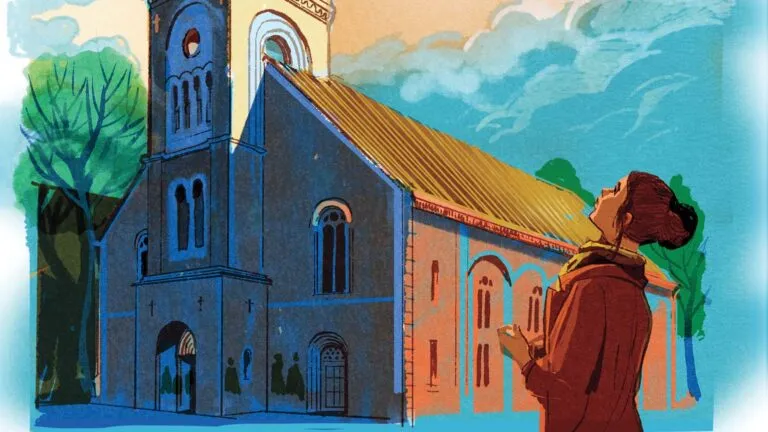Never has a Bible passage spoken so strongly to me or to my husband, Jim, or so inexplicably. That’s the only word for it: inexplicable.
Something happened that Sunday when we heard our pastor speak on the passage, something extraordinary, and we both knew, separately, just sitting in the pew, that we needed to act on it. Now.
“‘Do we own our possessions or do they own us?’” Jim said, quoting the lesson as we were driving home. “When he said those words, it was like a light flashed on. I couldn’t stop thinking about all the stuff we own.”
“I felt it too,” I said. “God clearly wants us to do something.”
“But what?” Jim wondered. “We don’t need extra space.”
Our four-bedroom home had plenty of space. Our oldest son, Matthew, was out of the house—married with a family of his own. Our daughter, Beth, was off at college. Our younger son, Mark, would be leaving in another year.
“Still, I feel like God is sending us a message,” Jim said.
We pulled the car into the driveway. No space inside our garage. Jim had two vintage Mustangs, a 1953 Jubilee tractor and a 1941 Chrysler he was hoping to rebuild. In our barn, he had old car parts, tires, rims, hubcaps, even a broken-down clothes dryer saved for scrap metal.
“Maybe you should start with the garage and the barn,” I said.
“Fine, but not my cars,” Jim said. “I’ll be able to work on them soon. Hey, what about your sewing room?”
What about my sewing room? All that fabric I’d saved up, those swatches that could make a nice quilt, and satin brocade, T-shirt knit, wool and sweatshirt material that people gave me. There were a lot of projects I’d do once I had the time.
I headed to the sewing room. Boxes were stacked against each wall, shoulder-high, and fabric was piled underneath the sewing table and around it so there was only a narrow footpath from the door to my two sewing machines.
I started in. It was the strangest feeling, almost like I was on autopilot. I had numerous trash bags full by the time Jim came inside for dinner.
“You know,” he said, “I looked at all the tools and scrap metal. For some reason it all looks disposable.”
Jim hauled a truckload of steel to the junkyard and sold it. I gave away boxes of fabric. It wasn’t enough. The feeling of having to make room was insistent.
I dug through closets and cleared out board games, toys, jigsaw puzzles, and gave it all to a friend’s garage sale. And every day, Jim found something else he didn’t need.
“This isn’t the right engine for that ’41 anyway,” he explained, patting the rusted hunk of metal like a precious Fabergé egg. Old clothes, linens, pots, pans, dishes, chintzy souvenirs—we were the biggest donor to our church rummage sale.
Our closets were clean and I could see my sewing-room floor. Everything we’d been storing in the kids’ rooms was cleared out.
We kept going, almost like a compulsion, like we were being directed.
One day Jim came in from the garage, wiping grease from his hands. “Those cars?” he said, shaking his head. “We should just go ahead and sell them.”
“Of course,” I said. Really? Of course? Just a few months earlier, before that strange Sunday in church, it would have been unthinkable!
We put an ad in the paper. The cars and the tractor sold immediately. Now we really were empty nesters. A totally empty nest, as if we were being prepared for something.
Beth came home at the end of her junior year and was shocked. “This looks like a new house!” she said. “But, Dad, your cars! Mom, your sewing room! How could you do it?”
“I don’t know,” I said.
Jim just shrugged.
There was something else. “Mom, Dad, I don’t want to go back next year. I need to take a year off and think about what I want to do.” We supported her decision.
She settled in to her old room and soon got a job working for an auto-repair shop in town.
That August, Matthew and his wife, Donna, came to see us about some financial problems they were having. They were behind on their bills and their credit cards were maxed out.
They were doing their best to get out of debt, but with two young boys to raise, they were falling further behind. They’d also taken in Donna’s teenage sister. “We’re going to lose our home,” Matthew said, burying his head in his hands.
“No,” I said. “You’re losing your house. You can come back home with us.” We had the space. And the now-empty barn was perfect to store their furniture. My old sewing room could be Donna’s sister’s room.
Empty nesters? Suddenly we’d become a household of nine. Make that 10. A month later Matthew and Donna told us they were expecting.
For three years, our house was full—of family, not stuff. Eventually, our daughter transferred to a new college. Matthew and Donna got their finances straight and moved into a nice fixer-upper in the country. Mark is on his own and doing well.
Jim and I are empty nesters again, you might say. But there is nothing empty about our lives. We are overflowing with collected blessings. Still, on Sundays when we sit together in church, we listen—listen for what might be our next new direction.
Download your FREE ebook, Mysterious Ways: 9 Inspiring Stories that Show Evidence of God's Love and God's Grace





